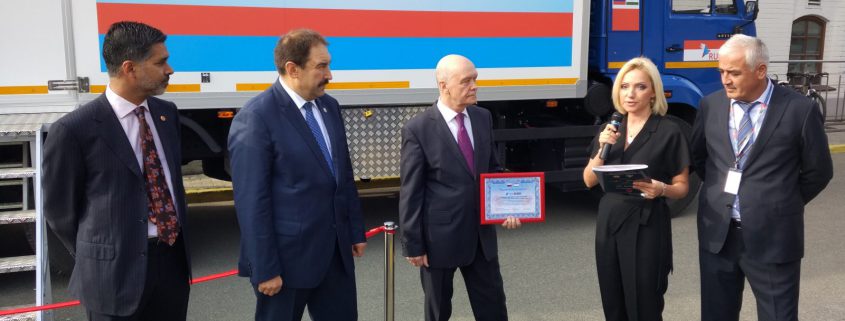Mobility and migration as an integral part of global economy
THERE WILL BE NO EFFICIENCY IF WE DON’T SOLVE OUR PROBLEMS TOGETHER
International scientific conference “Migration in Eastern Europe and Central Asia” started off with a pleasant event. A solemn ceremony of handing over the mobile medical diagnostic complex from the Russian Federation to Tajikistan took place in the parking lot of the Kazan “IT Park”. The vehicle was presented by Boris Kuzkin, Deputy Head of the Russian Federal Service for Surveillance on Consumer Rights Protection and Human Wellbeing (Rospotrebnadzor). The ceremony featured Ministers Adel Vafin, Elmira Zaripova and other officials and honorable guests. Acting Prime Minister of Tatarstan Alexei Pesoshin also took part in the event. The complex is divided into three parts: GP’s office which is equipped with an ECG system, fluorography and other diagnostic equipment, gynecologist’s office and a laboratory for rapid infectious diseases screening. Anyone could take a free HIV test throughout the day.

This will be the seventh complex to travel in the former Soviet Union countries. Three of them are already working in Kyrgyzstan, two – in Armenia, and one – in Tajikistan. With the help of these mobile systems 140 thousand people in remote mountainous and rural areas have already been examined. According to Boris Kuzkin, our neighbors in Uzbekistan, Tajikistan, Mongolia are natural epicenters of infectious diseases. The stronger is the migration, the closer is the interaction and the greater are the conditions for the transmission of infections that do not know political boundaries. Therefore, the Russian government allocates money so that we can unite our efforts to standardize the studies and implement anti-epidemic measures. “There will be no efficiency if we don’t solve our problems together”, – said Mr. Kuzkin.

In turn, the Minister of Health of Tatarstan Adel Vafin noted that the aid system should be understandable for the migrants so that the detection of diseases in new arrivals is ensured. According to the official, the single-window system for migrant workers’ medical examination, the system of epidemiological measures taken in case of the detection of STDs, HIV, tuberculosis deserves acknowledgment on a national level. “Noviy Vek” charitable organization also carries out serious preventive work with the migrants. Tatarstan is a progressive region in terms of addressing these issues, its experience could be used at the federal level. This was stressed out by the Chairman of the UN Country Team in the Russian Federation Vinay Saldanha: “From the UN point of view, Tatarstan could become a model for other Russian regions in dealing with such issues”.
ADAPTATION OF MIGRANTS IS THE MOST DIFFICULT PART
As for the conference, it was attended by 300 delegates – representatives of science and practice working in the field of migration, including the heads of federal and regional Russian institutions, heads of relevant government agencies, socially oriented non-profit organizations of Eastern Europe and Central Asia. Currently, Russia is the second country in the world in the number of migrant workers staying in its territory – about 12 million people. State migration policy till 2025 anticipates active involvement of foreign labor in the country’s economy.

In his welcome speech, the Acting Prime Minister of Tatarstan Alexei Pesoshin noted that the relations in the field of migration influence more and more the development of almost all the territorial entities of the Russian Federation. Tatarstan is no exception. “Our republic is developing dynamically, it has high economic potential, favorable geolocation, developed scientific and educational schools. All this determines high migration attractiveness. In this context, the issue of migration flow regulation is of particular importance”. Mr. Pesoshin expressed readiness to promote the ideas and proposals that are aimed at solving urgent problems of migrants in order for them to acquire worthy civic self-awareness in the republic and the modern society.

Liliya Taisheva, CEO of “Noviy Vek” NGO, was part of the Russia’s official delegation to the New York summit on refugees and migrants which was held for the first time in the UN General Assembly’s history at the level of Heads of State and Government. “Mobility and migration is an integral part of our lives, a part of the global economy. It will grow at the expense of labor markets’ integration, social communication and information networks. It should be noted that the migration must be a voluntary choice, not a forced decision”, – said Liliya Taisheva. This summit was a turning point in optimizing the management of international migration. The New York political declaration which was adopted during the event confirmed a positive contribution to the safe, orderly and regulated migration and at the same time indicated that forced displacement and irregular migration raised complex problems . Today, about 244 million people in the world are in the process of migration. In the last 15 years the number of migrants worldwide increased by 40%.


Deputy Chairman of the Tatarstan State Council Yuri Kamaltynov pointed out in his report that as of September 1, the number of foreign citizens residing permanently in the country amounted to more than 22 thousand which is 8% higher than last year. One of the biggest challenges is the adaptation of migrants. “The problem resides in the fact that it must combine two different directions – preservation of the cultural heritage that defines their lives and adaptation in the economically cultural environment of our country. We pay a great deal of attention to this in Tatarstan. Interethnic and interreligious relations are stable thanks to the close cooperation of state and public organizations. Meetings with the leaders of cultural autonomies are held on an ongoing basis, socially-oriented non-profit organizations working in this field are constantly supported”.

Irek Sharipov, deputy of the State Council, director of the Tatarstan House of Friendship, noted that Tatarstan and Russia appear to be more prepared for the migration processes than Europe. “We have more developed civil institutions in our country, more than 200 cultural associations which are considered mechanisms of communication between migrants and country residents. It’s very important”.
Commissioner for Human Rights in the Republic of Tatarstan Sariya Saburskaya told that a powerful NGO “Noviy Vek” is dealing with the migration issues in the republic. “They created a low-threshold center where migrants come to solve their problems, organized orientation courses for migrants that teach foreigners the basics of legislation, norms and behavior in the host society, rules of socially significant diseases’ prevention. They give all the information about the services in the city. All these projects are in high demand”. Mrs. Saburskaya called “M-Help” – a mobile app for the migrants – one of the most successful projects of “Noviy Vek”. It was developed using the resources of the Russian President’s grant for NGOs. This project has no analogues in Russia. Human Rights Commissioner in the Russian Federation Tatyana Moskalkova has already taken interest in this app.
In conclusion, the delegates highly praised the potential of the Russian program of assistance to Eastern Europe and Central Asia countries and Tatarstan’s experience in working with migrants as well as shared their experiences and suggestions on these issues.




